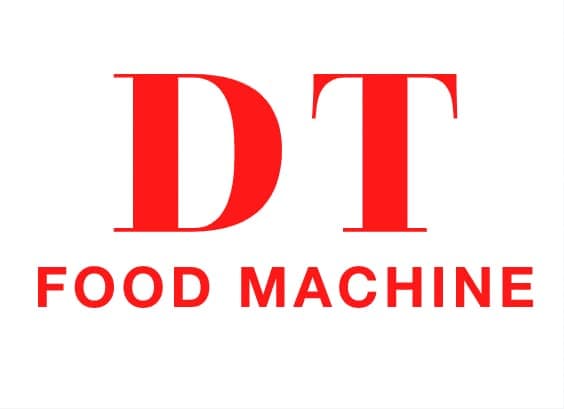In recent years, yogurt has become a staple product in the global dairy market due to its nutritional value and consumer demand for healthy, probiotic-rich foods. For dairy manufacturers looking to expand or modernize operations, choosing the right yogurt making machine and setting up an efficient yogurt production line is essential. This comprehensive guide covers equipment specifications, production processes, and technical data to help industrial buyers and manufacturers make informed decisions.
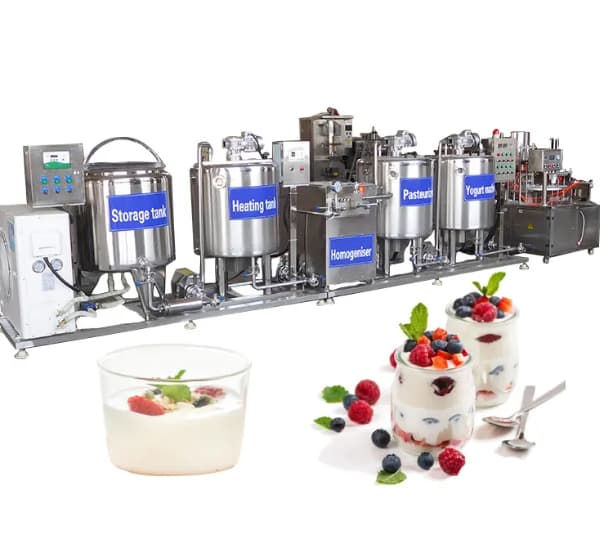
🏭 What is a Yogurt Making Machine?
A yogurt making machine is specialized dairy processing equipment designed to automate the fermentation, incubation, cooling, and packaging processes involved in yogurt production. These machines are suitable for small-scale, medium-sized, and fully automated industrial dairy plants.
🧊 Yogurt Processing Equipment Overview
Yogurt processing involves a sequence of machinery and operations to transform raw milk into finished yogurt products. Below is an overview of the standard equipment used:
🔧 Main Equipment in Yogurt Processing
- Milk reception tank
- Milk pasteurizer
- Homogenizer
- Fermentation tank (incubation tank)
- Cooling tank
- Yogurt filling machine
- CIP cleaning system
🛠️ Optional Equipment
- Flavor mixing tank
- Fruit feeding system
- Yogurt cup sealing machine
- Storage tanks
- Cold storage unit
📈 Technical Specifications of Yogurt Production Equipment
Here is a typical technical specification sheet for industrial yogurt processing equipment:
| Equipment Name | Capacity (L/hour) | Material | Power (kW) | Temperature Range (°C) | Automation Grade |
|---|---|---|---|---|---|
| Milk Pasteurizer | 500–10,000 | SUS304/SUS316L | 10–50 | 65–95 | Semi/Full Auto |
| Homogenizer | 500–5,000 | Stainless Steel | 7.5–30 | N/A | Manual/Auto |
| Fermentation Tank | 500–20,000 | SUS304 | 2–10 | 35–45 | Automatic |
| Cooling Tank | 500–10,000 | SUS304 | 1–8 | 4–8 | Automatic |
| Yogurt Filling Machine | 500–8,000 cups/hr | SS Frame | 1.5–10 | Room Temperature | Automatic |
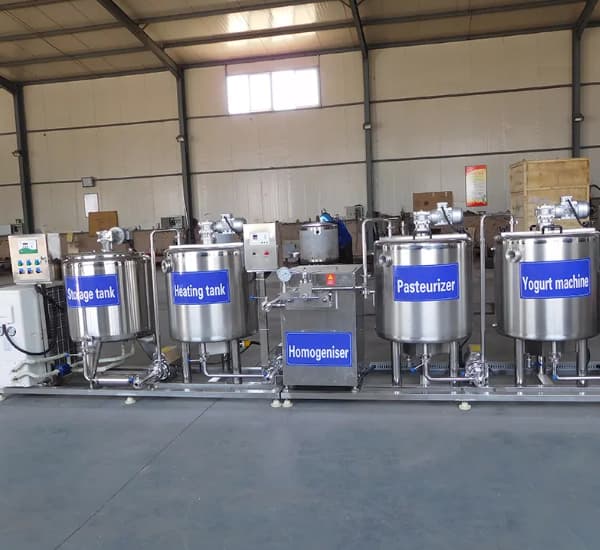
⚙️ How the Yogurt Production Line Works
An industrial yogurt production line consists of a step-by-step process that ensures hygienic, efficient, and consistent yogurt manufacturing.
✅ Step-by-Step Process:
1️⃣ Milk Reception and Standardization
- Raw milk is received and analyzed.
- Standardized to desired fat/protein levels.
2️⃣ Pasteurization
- Heated to 85–95°C for 15–30 seconds.
- Kills harmful bacteria while retaining nutrients.
3️⃣ Homogenization
- Breaks fat globules for smooth texture.
4️⃣ Cooling and Inoculation
- Milk is cooled to 42–45°C.
- Starter cultures are added.
5️⃣ Fermentation
- Mixture is incubated at 42°C for 4–6 hours.
- pH drops to 4.5, forming yogurt.
6️⃣ Cooling to Stop Fermentation
- Rapidly cooled to 4–8°C to halt microbial activity.
7️⃣ Flavoring and Mixing (Optional)
- Add fruits, sugar, or flavors.
8️⃣ Filling and Packaging
- Yogurt is filled into cups, bottles, or pouches.
- Sealed, labeled, and ready for distribution.
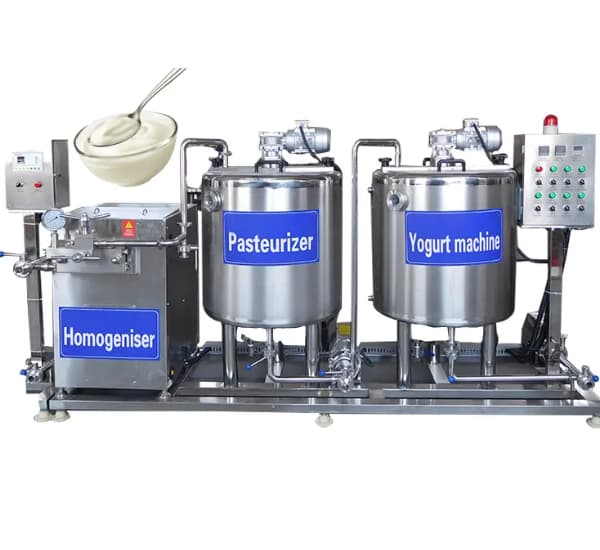
🥄 Automatic Yogurt Production Line
An automatic yogurt production line integrates all major functions with PLC control, ensuring minimal human involvement and maximum output efficiency.
💡 Features of Fully Automatic Yogurt Processing Line
- PLC + HMI control system
- Temperature and pH monitoring
- CIP (Clean-in-Place) system
- Real-time production monitoring
- Remote diagnostics (optional)
⚙️ Benefits:
- Reduced labor cost
- Improved hygiene and consistency
- Higher throughput (up to 20,000 L/day)
🧪 Yogurt Fermentation and Incubation System
The fermentation tank is crucial in yogurt processing. It ensures the microbial cultures develop properly under controlled conditions.
🌡️ Fermentation Tank Features
- Double-layer jacket design
- PID temperature control
- Agitator for even culture distribution
- Stainless steel structure
- Sanitary design with polished interior finish
🥤 Yogurt Filling and Packaging Solutions
Packaging yogurt efficiently requires specialized filling machines. The choice depends on your packaging style (cups, bottles, pouches).
🧃 Common Filling Machines:
- Rotary cup filling and sealing machine
- Linear yogurt filling machine
- Pouch filling and capping machine
- Bottle filling and labeling system
📦 Optional Add-ons:
- Date coder
- Foil sealing
- Automatic case packing
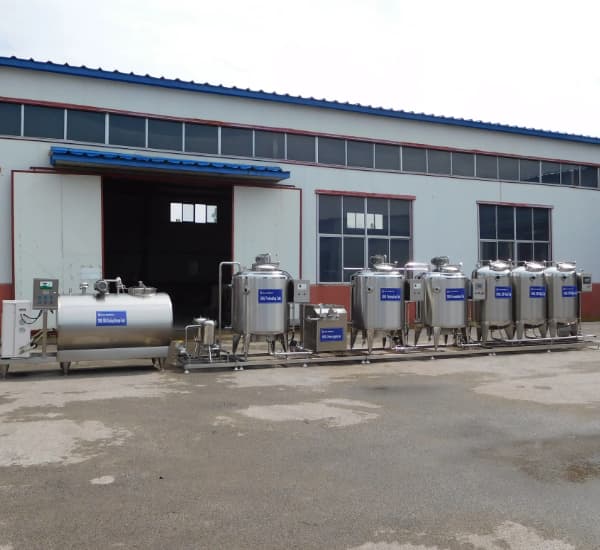
🧼 Hygiene and CIP Cleaning System
Maintaining hygiene is vital in dairy production. A CIP (Clean-in-Place) system is integrated into most yogurt production lines.
🚿 CIP System Functions:
- Automatic internal cleaning of tanks and pipes
- Multistage washing with acid, alkali, and water
- Ensures food-grade sanitation
- Reduces downtime between batches
- Conforms to 3A, CE, and ISO standards
🌍 Applications of Yogurt Production Equipment
Industrial yogurt making machines are used across various scales:
🧁 Application Scenarios:
- Commercial dairy factories
- Yogurt startups and artisanal producers
- School milk programs
- Supermarket private-label brands
- Export-oriented dairy farms
🧩 Compatible Products:
- Set yogurt
- Stirred yogurt
- Drinkable yogurt
- Flavored yogurt
- Fruit-on-the-bottom yogurt
- Greek-style yogurt
- Organic and probiotic yogurt
📌 Factors to Consider Before Buying a Yogurt Making Machine
- Production capacity requirements
- Type of yogurt (set, stirred, drinkable, Greek)
- Energy efficiency
- Ease of cleaning and maintenance
- Material and build quality
- Local support and service
- Regulatory compliance
- Integration with existing systems
📦 Packaging Formats for Yogurt Products
Packaging format plays a major role in market appeal and shelf life. Yogurt can be packaged in a variety of formats depending on target demographics and distribution needs.
📤 Popular Formats:
- Single-serve cups (100–200ml)
- Family packs (500ml–1L)
- Drinkable yogurt bottles
- Squeeze pouches
- Bulk packaging for hotels/restaurants
💰 Cost and ROI Analysis of Yogurt Production Line
Investing in a yogurt production line involves upfront equipment costs, installation, utilities, and workforce training. However, return on investment (ROI) is typically high due to the growing global demand for dairy products.
📉 Approximate Investment Breakdown:
- Equipment: 60–70%
- Installation & Commissioning: 10–15%
- Utilities Setup (water, steam, electricity): 10%
- Packaging & Labeling: 5–10%
📊 ROI Factors:
- Daily production volume
- Market price of finished yogurt
- Shelf life and wastage rate
- Labor and utility cost
- Equipment lifespan and maintenance
🛒 Where to Buy Yogurt Production Equipment?
You can source yogurt making machines and complete yogurt production lines from professional manufacturers specializing in dairy processing machinery. Leading suppliers offer customization, installation support, and staff training.
🌐 Tips for Choosing a Supplier:
- Check certifications (ISO, CE, 3A)
- Request project case studies
- Verify installation and after-sales services
- Compare technical specs and pricing
📚 Conclusion
Investing in the right yogurt making machine and setting up a reliable yogurt production line is essential for high-quality, consistent, and scalable yogurt manufacturing. From pasteurization to packaging, every step must be optimized for hygiene, efficiency, and taste. By understanding the equipment specs and production flow, dairy businesses can make smarter, more profitable investments.
With a rising global demand for probiotic-rich foods, now is the perfect time for dairy businesses to modernize operations and meet consumer expectations with efficient and sanitary yogurt production systems.
